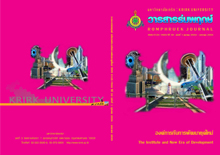ธรรมาภิบาลของภาครัฐ: นัยจาก Worldwide Governance Indicators
Main Article Content
Abstract
Government Governance: An Implication from Worldwide Governance Indicators
Government governance is one of the major determinants of the economic and social development of the nations. This article reviewed government governance of 213 countries worldwide which was categorized into six dimensions, including control of corruption, government effectiveness, political stability and absence of violence/terrorism, regulatory quality, rule of law and voice and accountability, based on the study of the World Bank under Worldwide Governance Indicators project. After the revision, it was found that developed countries had far higher government governance than developing countries, implying that government governance is one of the factors which drive the economic and social development of the nations. Moreover, Thailand could not yet be satisfied with its current government governance since its rank was quite low.
Article Details
Every article published in the Romphruek Journal of the Humanities and Social Sciences is the opinion and point of view of the authors. Thery're not the viewpoint of Krirk University or the editored department. Any part or all of the articles for pablication must be clearly cited.


